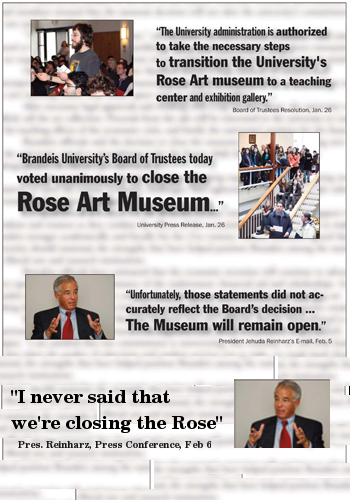So the CARS Committee report came out. There are some unpopular proposals in there – cutting the AAAS, Classics, and American Studies Departments, and cutting the 4-year BA/MA Programs are the most dramatic.
People are quite upset. They really care about the future of academics at Brandeis. Then what explains the rather tepid response to the structures put in place to gather community ideas/opinion before the publication of the report? The discussion forums are mediocre in size and the second Budget Cut Town Hall had less than 100 students attend.
So, after we fought so hard for some structures of democratic process, why were they rather unused?
I don’t think there is any one true answer. It’s probably a combination of intimidating complexity, the lack of knowledge of what the committees were discussing the whole time, lack of an organized effort to get people to comment, a feeling of disempowerment, and many other factors.
Matthew Yglesias points out to a related phenomenon:
There was an assumption, at one time, that you could make government more democratic and accountable by, in essence, multiplying the number of elected officials.
In retrospect, I think this was based on flawed logic and faulty assumptions that forgot to account for the fact that people have a limited amount of time they’re realistically going to spend monitoring public officials. If you live in New York City you’re voting for the President of the United States, two United States Senators, one member of congress, the Governor, the state Attorney-General, the state Lieutenant Governor, the state Comptroller, a mayor, a District Attorney, a city Comptroller, a Borough President, and a city council member in addition to a variety of state and local judges. And that’s entirely typical for the United States. Add a school board member into the mix and the situation gets even more out of control.
The result of this sort of process is the absence of meaningful accountability rather than its presence. The result is that special interests—the people with strong self-interested motives to pay attention—wind up exerting wildly disproportionate influence.
Were all the CARS subcommittees, events, online forums, (as well as the established centers of power – Student Union, Administration, Faculty, etc) part of this phenomenom? Power is so widely dispersed that people don’t know where to start their scrutiny.
Again, though many factors likely contributed to this lack of democratic process, I think one big one was the closed nature of the CARS committees themselves. The General Population, for example, did not know that the CARS committee was looking for departments to cut, and therefore couldn’t provide any constructive criticism until after the fact. Even for less dramatic issues, it’s hard to participate in discussions and add your voice when you have no idea what the conversation currently is. I hope this problem is addressed in the future.






